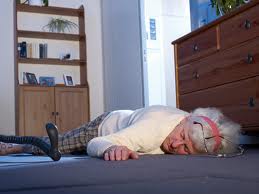Unconsciousness refers to a state at which the casualty is not able to respond to any external activity—this is also known as comatose state or just coma.
The person may not be responsive to people or certain actions by being either confused or unaware mentally. A change in a person’s awareness is called altered mental status. This includes
Note that unconsciousness or altered state of mind is a medical condition and should be considered as an emergency situation. Recognizing and managing unconscious victims is a major component of workplace approved first aid and CPR training. To learn how to manage unconscious patients with “hands on” training and certification enrol with one our training providers today.
To ensure that the casualty is ‘mentally’ awake, ask him these questions:
- What is your name?
- How old are you?
- What is the date?
You can thus, determine the casualty’s state of mind—if he is unable to answer any of the questions, consider him to be in an altered state of mind.
Note that not being awake or just being asleep does not imply that the casualty is unconscious. To determine if the person is sleeping or unconscious, shake him and call out his name loudly enough to wake him up. If he does not wake up consider him to be unconscious. It is crucial to call for help immediately as an unconscious person does not have control of many bodily mechanisms including coughing and clearing the throat—which may also lead to choking and death.
Causes of unconsciousness
Unconsciousness may be a symptom of another major underlying condition. Unconsciousness results from many major complications such as shock, heart attack or drug abuse such as alcohol abuse.
Sometimes unconsciousness that is short-lived, known as fainting, is a result of low blood sugar, low blood pressure, heat stroke or dehydration. However, you should not waste time trying to figure out what caused the problem and call for an ambulance immediately and then look for signs of the cause. Note that unconsciousness may also be caused by life threatening conditions such as nervous or heat problems.
Some common causes of fainting include:
- Shock—this can be physical or emotional
- Strained bowel movements
- Hyperventilation
- Breathing difficulties
Symptoms
- The casualty will not respond to loud sounds, touch or any other form of activity
- Confusion
- Headaches
- Sleepiness
- Light-headedness
- Inability control or move body parts such as arms or legs
- Heart palpitations
- Incontinence—loss of bladder and bowel control
- Stupor
Treatment
- If you are not alone, ask someone to call 911 or a local emergency number. If you are alone, call 911 yourself.
- Check the airway and clear any obstructions if present.
- Check the casualty’s pulse and breathing. If the casualty is not breathing, begin CPR immediately.
- Place the casualty in the recovery position—i.e. lay him on his side. Make sure he has not suffered any spinal injuries before moving him. At any point, if the casualty stops breathing, begin CPR.
- Cover the casualty with a blanket and make sure he is comfortable until help arrives.
If you see someone fainting, make sure you catch him before he falls as he may suffer from major injuries by falling. Lay the casualty down and raise his feet to encourage circulation. In case, the casualty is feeling faint due to low blood sugar, give him a sugary drink or something sweet to eat until he is fully conscious again.
Caution
- Do not move the casualty if he has suffered from any hip, back or head injuries
- Do not force any food or drink into the casualty’s mouth while he is unconscious
- Do not try to put a pillow under the casualty’s head
- Do not try to wake a casualty by slapping him or splashing water to his face
- Do not leave the casualty alone until help arrives
When to seek medical attention
Call an ambulance if:
- The casualty’s unconsciousness is not brief—more than a minute
- The casualty has suffered any major injuries due to the fall
- The casualty has diabetes
- The casualty has undergone seizures
- The casualty is not breathing
- The casualty lose bladder or bowel control
- The casualty is pregnant or over 50 years of age
Call for emergency help, if the casualty returns to consciousness, but the following conditions occur:
- He is feeling chest pain or any form of discomfort due to pressure or unusual heartbeat
- He is unable to move his limbs
- He is not able to speak or see properly
Prevention
- Standing in one place for too long—especially in people who frequently feel faint may become unconscious. Therefore, avoid standing in one position for too long, try to walk a little
- Drink plenty of fluids especially while you are working in the sun
- If you feel faint, sit and put your head between your knees or just lie down
